Gujarat Board GSEB Class 11 Commerce Accounts Important Questions Part 2 Chapter 1 Rectification of Errors Important Questions and Answers.
GSEB Class 11 Accounts Important Questions Part 2 Chapter 1 Rectification of Errors
Answer the following questions in one sentence :
Question 1.
What is ‘Rectification Entry’?
Answer:
An accounting entry which is passed to cancel the wrong accounting effect and to give correct accounting effect to the affected account is called ‘Rectification Entry’.
Question 2.
What is meant by error of omission?
Answer:
When a transaction is totally omitted to be recorded in the journal or the subsidiary S books or the ledger, such an error is known as an error of omission.
Question 3.
What do you mean by compensatory errors?
Answer:
In the books of accounts when more than one error exists but because of their nullifying effects on both debit and credit sides, the trial balance tallies, such errors are called as compensatory errors.
Question 4.
State the meaning of Suspense Account.
Answer:
When the trial balance does not tally because of some accounting errors, but there is an urgency for preparing final accounts, temporarily the difference in the trial balance is transferred to one account, in order to get it tallied and t that account is known as a Suspense Account.
![]()
Question 5.
When is Suspense Account opened?
Answer:
Suspense Account is opened when after the preparation of trial balance if the total of debit column of trial balance does not tally with the total of credit column.
Question 6.
What is error of commission?
Answer:
While writing the books of accounts, if the transaction in primary books are recorded either more or less than the correct amount or it is recorded in worng subsidiary book, such an error is known as an error of commission.
Question 7.
To which account the difference of trial balance is transferred temporarily?
Answer:
The difference of trial balance is temporarily transferred to Suspense Account.
Question 8.
On which basis Suspense Account is opened?
Answer:
Suspense Account is opened on temporary basis.
Question 9.
State the rule to rectify the accounting errors.
Answer:
Generally following is the rule to rectify the accounting errors:
“Undo what is wrong, Do what is correct.”’
Question 10.
Which are one-sided errors?
Answer:
Errors affecting the trial balance are one-sided errors.
Question 11.
Which type of errors cannot be detected easily?
Answer:
Errors which do not affect the trial balance cannot be detected easily.
![]()
Question 12.
Where is the credit balance of Suspense Account to be shown?
Answer:
The credit balance of Suspense Account is to be shown on Liabilities side of Balance Sheet.
Question 13.
If the debit total of trial balance is more, what balance would the Suspense Account show?
Answer:
If the debit total of trial balance is more, then the Suspense Account shows a credit balance.
Question 14.
Where is the balance of Suspense Account shown?
Answer:
The balance of Suspense Account is shown in the Balance Sheet.
Question 15.
Which type of errors are corrected with the help of the Suspense Account?
Answer:
Only those errors which affect the trial balance, are corrected with the help of the Suspense Account.
Question 16.
Where is the debit balance of Suspense Account to be shown?
Answer:
Debit balance of Suspense Account is to be shown on Assets side of Balance Sheet.
Question 17.
What is one-sided error?
Answer:
One-sided error refers to an error which is committed in respect of either debit or credit effect of an account provided other effect of an account is correctly recorded.
Question 18.
Why errors of principle do not affect the trial balance?
Answer:
Errors of principle do not affect the trial balance because the amount of the transaction is same but instead of one account any other account is debited or credited.
Question 19.
Which account is opened when there is a confusion about the debiting or crediting an account?
Answer:
Suspense Account is opened, when there is a confusion about the debiting or crediting an account.
![]()
Question 20.
If the credit total of trial balance is more, what balance would the Suspense Account show?
Answer:
Suspense Account shows a debit balance if the credit total of trial balance is more.
Pass necessary rectification entries to rectify the errors:
Question 1.
Pass necessary rectification entries in the books of Shyam to rectify the following errors :
1. ₹ 1,500 withdrawn from bank for personal use is left to be recorded.
2. Machine of ₹ 5,600 is purchased from Naresh is recorded in Purchase book.
3. ₹ 500 paid to Kajal is debited to Raj’s account by mistake.
4. Goods of ₹ 700 sold to Switoo is recorded in purchase book by mistake.
Answer:
Rectification entries in the books of Shyam
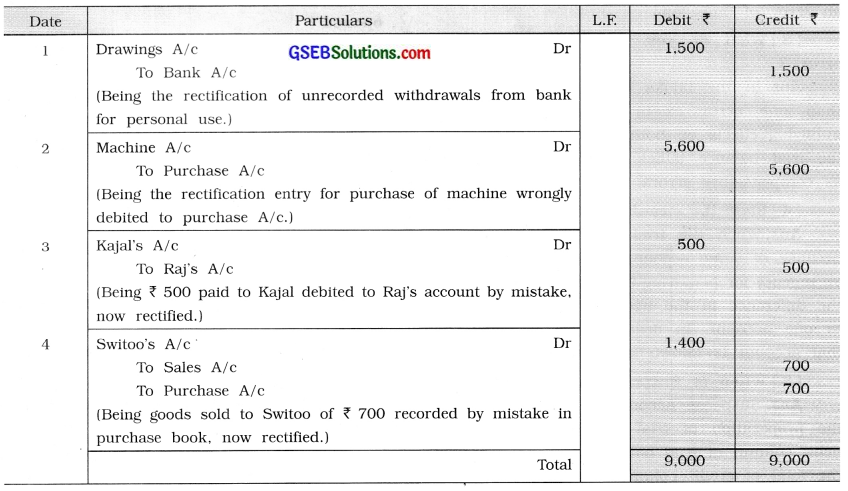
Question 2.
Prepare rectification entries to rectify the following errors detected while preparing final accounts of Shri Balram as on 31 – 3 – ’18 :
1. Installation charges paid 7 2,000 on purchase of machinery is debited to Sundry expense account.
2. ₹ 4,200 paid to Devanshi is recorded to Kajol’s account by mistake.
3. Goods of ₹ 4,100 sold to Nil am is recorded in purchase book by mistake.
4. ₹ 150 credited by bank as interest in passbook recorded on payment side of cashbook.
Answer:
Rectification entries of Balram
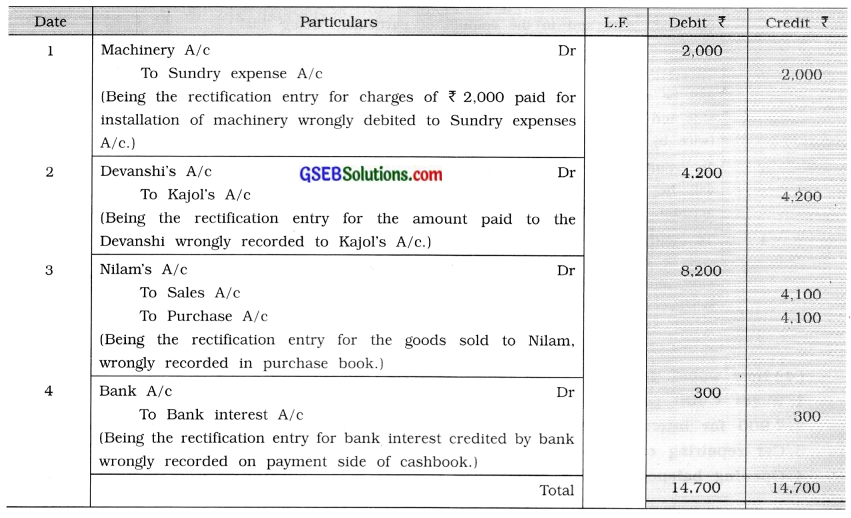
Question 3.
Rectify the following errors committed while writing the books of Sagar:
1. Total of goods return book is undercast by ₹ 1,000.
2. Salary paid ₹ 2,500 is debited twice to Salary account.
3. Balance of ₹ 8,000 of Manoj’s account, a debtor, is left unrecorded in the trial balance.
4. Opening balance of Bank account ₹ 2,500 is brought forward as 12050.
Answer:
Journal Proper of Shri Sagar
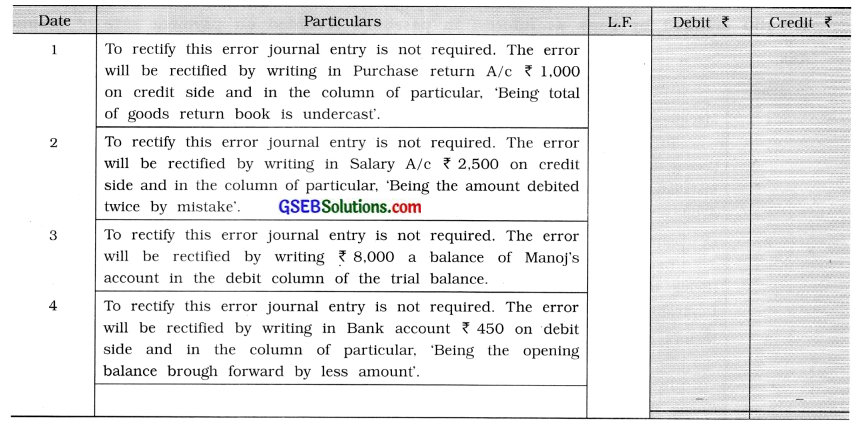
Question 4.
How would you rectify the following errors of Nilkanth?
1. Wages ₹ 400 paid on behalf of Danish is debited to Wages account.
2. ₹ 900 for interest received is posted on the debit side of the Interest account.
3. Car repairing expenses ₹ 3,000 is debited to Car account.
4. Opening balance of Bills receivables account is ₹ 15,000, which is written on the credit side.
Answer:
Journal Proper of Nilkanth
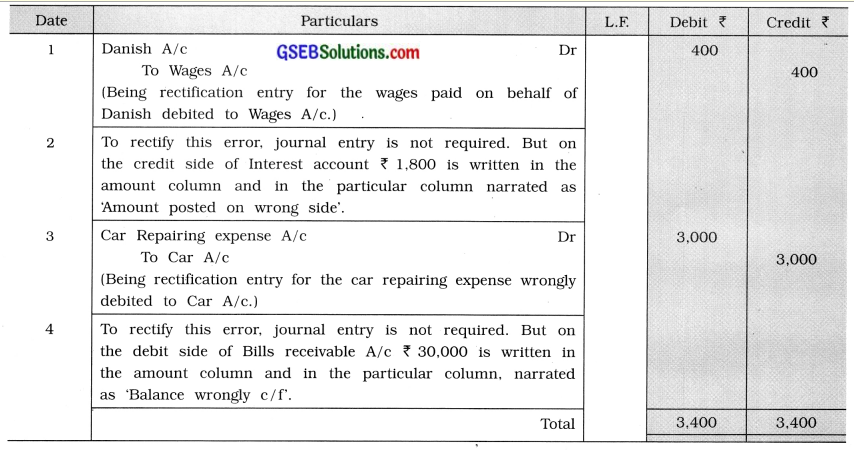
![]()
Question 5.
The following errors are detected after the final accounts are prepared. Give rectification entries to rectify in the books of Jalaram.
1. ₹ 18,000 received from Hiral is posted on the debit side of her account.
2. Total of sales book is overcast by ₹ 5,000.
3. Life Insurance premium of ₹ 8,000 is debited to Insurance premium account.
4. ₹ 8,600 withdrawn from the bank, is posted in the Bank account as ₹ 6,800.
Answer:
Journal Proper of Shri Jalaram
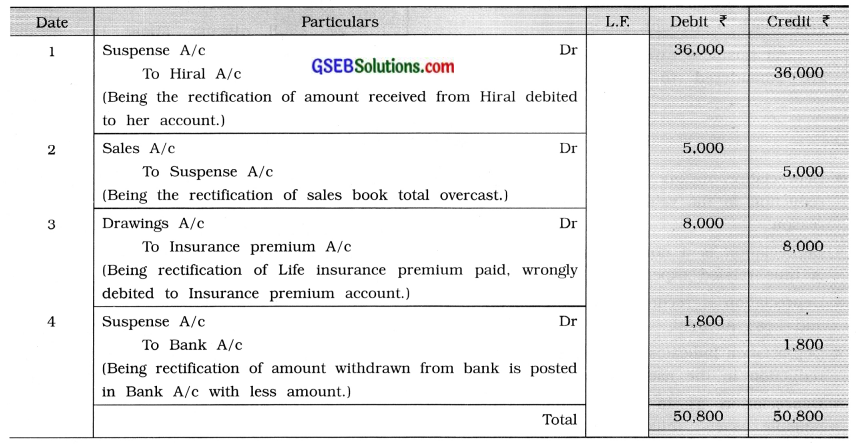
Write the correct option from those given below each question :
Question 1.
Wages paid for installation of machinery is debited to wages A/c. Which type of error is this?
(a) Error of omission
(b) Error of principle
(c) Compensatory error
(d) Error of commission
Answer:
(b) Error of principle
Question 2.
Furniture purchased for ₹ 25,000 is wrongly recorded in the purchase book. Which type of error is this?
(a) Error of omission
(b) Error of principle
(c) Compensatory error
(d) Error committed while writing the primary books
Answer:
(d) Error committed while writing the primary books.
Question 3.
Which type of the account, the Suspense A/c is?
(a) Personal A/c
(b) Real A/c
(c) Nominal A/c
(d) None of these.
Answer:
(a) Personal A/c
Question 4.
Which type of errors may be committed, if trial balance gets tallied?
(a) Errors of principle
(b) Errors in totalling in subsidiary books
(c) Errors regarding posting
(d) Errors regarding balance of an account
Answer:
(a) Errors of principle
![]()
Question 5.
Which of the following errors, affect the trial balance?
(a) Errors of principle
(b) Errors regarding posting
(c) Errors of omission
(d) Compensatory errors
Answer:
(b) Errors regarding posting
Question 6.
An error detected and rectified after the final accounts are prepared will affect the profit-loss, if it affects ………………. and ……………. types of accounts.
(a) Personal, Real
(b) Real, Nominal
(c) Goods, Nominal
(d) Personal, Nominal
Answer:
(c) Goods, Nominal
Question 7.
If capital expenditure is recorded as revenue expenditure in the books of accounts by mistake, then this error is known as …………………………. .
(a) error of omission
(b) error of principle
(c) compensatory error
(d) error of writing wrong entry.
Answer:
(b) error of principle
Question 8.
In which book, rectification entries are recorded?
(a) Cashbook
(b) Journal
(c) Journal Proper
(d) Ledger
Answer:
(c) Journal Proper
Question 9.
How many types of accounting errors are there?
(a) One
(b) Two
(c) Three
(d) Four
Answer:
(b) Two
Question 10.
How many types of errors, which do not affect the trial balance, are there?
(a) Three
(b) Four
(c) Five
(d) Six
Answer:
(c) Five
![]()
Question 11.
How many types of errors, which affect the trial balance, are there?
(a) Three
(b) Four
(c) Five
(d) Six
Answer:
(b) Four
Question 12.
Which type of balance Suspense A/c has?
(a) Debit
(b) Credit
(c) Debit or Credit
(d) None of these
Answer:
(c) Debit or Credit
Question 13.
Where is Suspense A/c shown?
(a) In Trading Account
(b) In Balance Sheet
(c) In Profit & Loss Account
(d) In Ledger
Answer:
(b) In Balance Sheet
Question 14.
To which account, difference of trial balance is transferred temporarily?
(a) Cash A/c
(b) Capital A/c
(c) Drawings A/c
(d) Suspense A/c
Answer:
(d) Suspense A/c
Question 15.
If sales book is undercast, sales account should be ………………………… to rectify the error.
(a) debited
(b) credited
(c) cancelled
(d) updated
Answer:
(b) credited
Question 16.
Which types of errors do not affect the trial balance?
(a) Errors regarding posting
(b) Errors regarding balance of an account
(c) Errors of principle
(d) Errors committed while preparing the trial balance
Answer:
(c) Errors of principle
Question 17.
When one error removes the effect of another error, it is called ……………….. .
(a) error of posting
(b) error of principle
(c) error of omission
(d) compensatory error
Answer:
(d) compensatory error
Question 18.
Errors affecting the trial balance are ………………….. .
(a) one sided errors
(b) two sided errors
(c) three sided errors
(d) more sided errors.
Answer:
(a) one-sided errors
Question 19.
When is Suspense Account closed automatically?
(a) When some of the errors are rectified.
(b) When most of the errors are rectified.
(c) When all the errors are rectified.
(d) None of these
Answer:
(c) When all the errors are rectified.
Question 20.
For which type of error, is journal entry required for rectification?
(a) One-sided errors
(b) Two-sided errors
(c) Overcasting errors
(d) Under casting errors
Answer:
(b) Two-sided errors